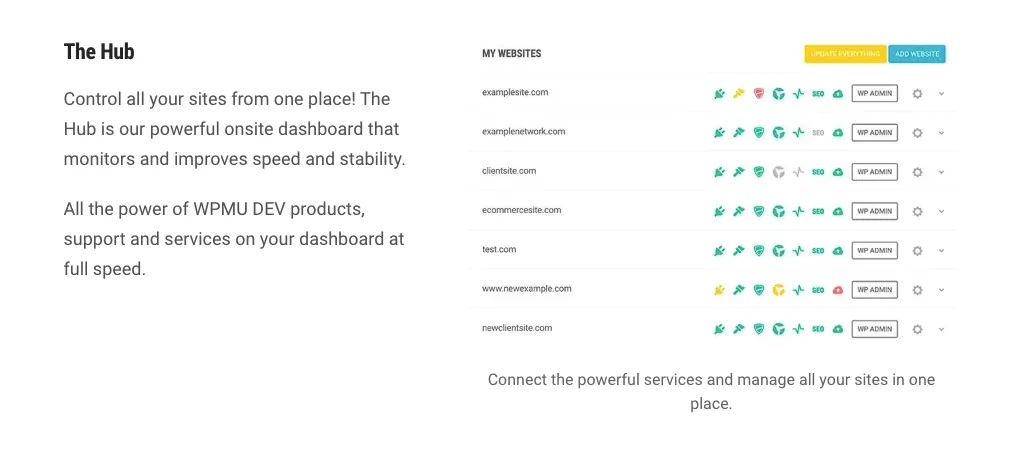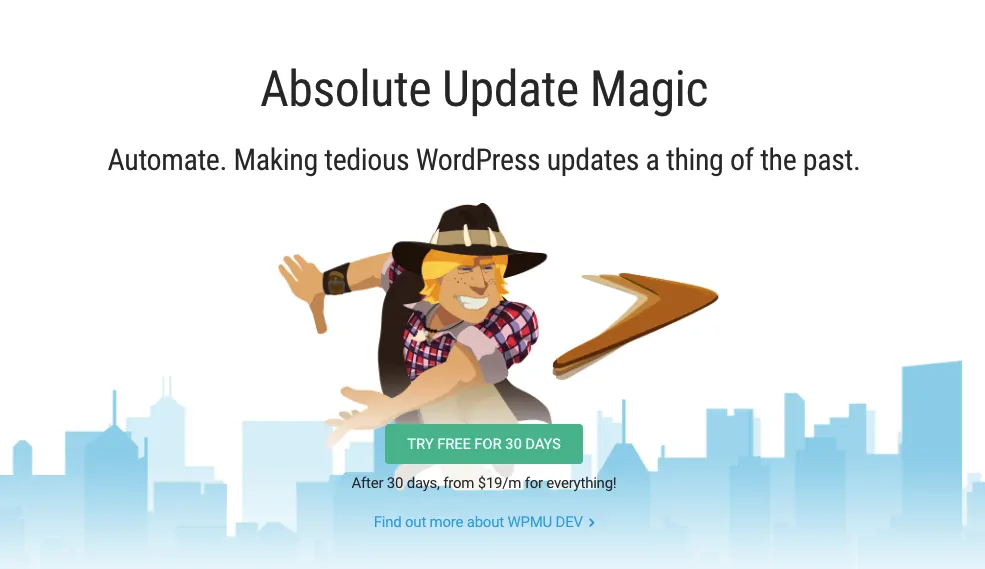If you’re in the business, you must already know the value of quality hosting. It’s one of the main pillars that prompt up your site. In case you’re new to website management, you know now where to put your focus. A good hosting service will make your site fast, reliable, and secure, ensuring your visitors will always come back. In the last ten years or so, we’ve seen the number of hosting providers skyrocket, making it really hard to figure out what service is worth your time.
That’s where we come in. We’ll present you with a more than a viable option in WPMU DEV hosting. Naturally, we’ll quickly go through everything on offer, but our main focus will be on security, more specifically secure WordPress hosting, which, with WPMU DEV, you’ll get in spades.
Contents
Data centers all around
It’s always best to start presenting everything and then going into more detail. That way, you’ll get a sense of what features are contained within. As you would expect, a hosting service needs to provide you with the infrastructure that makes your site live up to certain standards. The first step in achieving those goals is actual physical infrastructure – servers. Without these servers, located in various data centers that can handle the load in terms of uptime, speed, and overall stability, you can’t really expect anything else.
To ensure you’re getting the best out of the deal no matter where you or your visitors are located, WPMU DEV has established eight data centers around the world (US, UK, Canada, Netherlands, Germany, India, and Singapore). Having your servers located physically near you means less travel time for your data, which in turn means quicker access to that same data.
Depending on where most of your traffic will come from, with this service, you’ll be able to get the best performance from servers that are located in that part of the world. Other options may have data servers just in the US and Europe and have to reroute all data flow through them. As you would guess, this doesn’t bode well for the performance on the sites being hosted. WPMU DEV eliminates this problem entirely with such a wide data center network.
Fully managed hosting
You’ve probably heard of terms such as shared and dedicated hosting, but you may not be aware of the importance of these labels. Essentially, there are two types of hosting (for WordPress sites, at least) with an additional option coming as a slight variation on the standard format.
Shared hosting has seen an uptick in popularity over recent years, with the advent of so many smaller, privately owned sites, blogs, and webshops. It exchanges exclusivity for lower prices. Just as its name suggests – shared hosting is hosting where a server is shared with several sites. In most cases, traffic is limited in some way so that everybody gets a fair share, and there is usually an option to advance through the paying tiers in order to increase the allocation of resources for your site. Since the server is shared, it enables the providers to charge less for their services, making them a favorable option for those just starting out or smaller sites with low traffic flow.
Unlike shared hosting, dedicated hosting offers the opposite. Servers or virtual private servers are used by single domains, or in certain cases, a couple of them. The resource allocation is centralized, and therefore, there are no limitations to your traffic. Advantages don’t stop at that, however. Because of the server to domain ration, everything is much more stable and faster, and your sites will be getting much better SEO ratings because of this. Generally speaking, dedicated hosting is the next logical step in the growth cycle of your site once you’ve outgrown shared hosting. The only negative aspect is, of course, the price. Since the costs aren’t being split among multiple users, you’ll have to take it all on yourself. If your site has a number of visits that range in the high five or six figures (monthly), it’s recommended you use dedicated hosting.
If dedicated hosting is a step up from shared hosting, then managed hosting is a step sideways. Managed hosting has all the benefits of dedicated hosting, with the added feature of managing everything hosting related for you. This solution is perfect for bigger companies who don’t have time and/or expertise to bother will all the ins and outs of website management and thus outsource those tasks. It’s obvious, but let’s point it out nonetheless – managed hosting is the most expensive option. It’s, however, the only hands-off option out there, so unless you want to dig into the material yourself, this is the only option for you.
WPMU DEV provides, as you probably figured out by now, managed hosting. With it, you get free SSL certificates, regular backups, free migrations, state of the art security and analytics, and 24/7 live chat support. Essentially, you get everything you need to make your site successful without having to lift a finger in any of the background technical aspects.
Secure hosting
After slowly bringing you in, we’ve finally come to the real meat of the article – secure WordPress hosting with WPMU DEV. We’ve briefly touched on the importance of secure hosting service, and it’s time to delve into all the details. There are various ways to ensure security that’s up to standard, and generally, they aren’t mutually exclusive, so you’ll be smart to stack them all up. What WPMU DEV has going for it is the exclusive all-in-one Defender layered protection system in place. This type of protection will enable you to build the namesake layers to deter any potential malicious actions that could happen.
Two-factor authentication
The most common way to ensure data security is the two-factor authentication, that’s becoming something akin to a standard in the industry. For those who aren’t familiar with it, two-factor authentication is a security method that confirms a user identity (either a frontend visitor or a backend user) by using two variables. The first one is the same no matter where you’re using it – the login password connected to your username. The second variable can differ and is vaguely divided into three types:
- Phone authentication – usually, the verification is done through SMS, and in some rare cases, it’s voice-based (used only in banks now). Most of us have used this in one way or another. You get an SMS with a code that you then input in the software you’re using – pretty straightforward, it works very much like a token, if anybody even still remembers those. It’s important to note this type of authentication is being used less and less.
- Physical authentication – speaking of tokens, we get to physical authentication. Used primarily by banks tokens have been in use for decades and are surprisingly reliable. A new six-digit code is generated every 30 seconds, making them highly secure since they require the actual token to be in your possession that you’ll then interact with. The reason why they’re good is also their biggest downside. Since they need to be manufactured and handed out in very large numbers, they simply aren’t financially viable. Just like phone authentication, they’re used less and less.
- Software authentication – an advanced type of phone authentication, here you’re using apps that are connected to the service you’re using and generate a one-time password on request. They’re really easy to set up and use, and aside from the minuscule cost of developing the apps, they’re virtually free. Since we’ve all been using smartphones and their apps for years now, taking everything into account, chances are software authentication is here to stay.
The process of enabling the feature with WPMU DEV is simply a matter of turning the toggle on or off; there’s really nothing to it. You’ll even get to choose which roles it’s enforced and on which it’s voluntary. We recommend you take advantage of this, especially if you’re outsourcing your backend work and, depending on what kind of content you’re running on your site, you could even enforce it on your visitors. It’s worth mentioning that WPMU DEV uses the Google Authenticator app for login, so nobody should have any trouble in using it.
Backup
Have you ever heard a story about somebody who lost hours or even days of work because something happened to their computer, everything got fried, and now they can’t get any of the data back, because they didn’t back up their work? Of course, you have, we all have. The thing is we don’t regularly backup our things until something like that happens to us – experience is the best teacher after all.
There is a big difference between losing some private data and a crash of your site, which affects your visitors, staff, associated vendors, and who knows who else. That’s precisely why we can’t stress enough how important it is to keep up to date backups of your database. Luckily, implemented in the Hub is an automated backup system that both keeps daily backups and lets you create manual backups if you need them. If anything happens, you can revert to data that’s only a day old, which isn’t the end of the world. The basic package is 10 GB; however, you can upgrade it if that isn’t enough for you.
The Hub
With logins out of the way, let’s see what else is there. Secure WordPress hosting with WPMU DEV is most encapsulated in the Hub – a dashboard-type platform from where you get to manage, among other things, your site security. The keyword here is “manage.” Where most other services only let you monitor your various statuses, here you take an active role in the process. Of course, everything is hands on to the point of your choosing; this is managed hosting after all.
Up to date – Automate
One of the main reasons sites get breached is because we get too comfortable and either forget or outright refuse to do what’s needed. Be honest, how many times have you postponed, or declined an update – we’ve all done it. However, there is a reason this needs doing. Hackers looking to breach a site can’t wait to get their hands on out of date software.
Automate is a special extension integrated into the Hub that keeps track of all things related to your WordPress site. This includes regular WordPress updates, themes, and plugins. You’ll never have to worry about any of it, it’s all automated and done in the background, because of the regular check, so you won’t be losing any time. You’re going to be informed of all the actions and potential problems that arise but won’t have actually to do any of the cleanups yourself.
Even if you’re not keen on an automated system doing everything for you without your confirmation, there’ll be a handy “update all” function where you can manually update everything when you see fit, not having to go from app to app.
Support
Secure WordPress hosting with WPMU DEV doesn’t cover only the prevention part of an attack. Sooner or later, chances are something bad will happen or has already happened. If it ever comes to it, you’ll be more than glad of the excellent support team they have. They’ll walk you through all the steps you’ll need to do and those they’re doing for you.
You’ll be reverted to the last clean version of your site, and they’ll immediately start scanning for any and all weak points that could have caused the breach in security. After finding the cause, they modify the firewall specifically to counter the threat. Even though these will be trying and stressful times, you’ll be able to find them as a silver lining.
Summary
Hosting is important. Security is also important. It’s important to find a service that handles both of those on a top-level to ensure your site is always running smoothly. With a unique approach that, at the same time, lets you be very hands-on, or completely leave everything in the hands of the WPMU DEV team, this service provides a perfect blend for practically any type of user. All the features that aren’t automated are very easy to use, so everyone will be able to get into it quickly, so anybody will be able to jump into it, no matter their previous knowledge. If you’re looking for a professional solution that will help you grow your site to the next level, you won’t have to look further.
Written by Lars Koudal
















